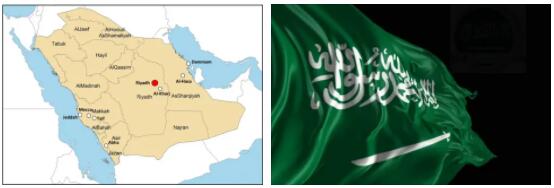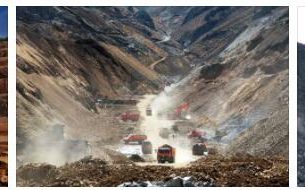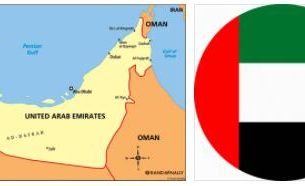Shopping
Overview
The souks sell incense and matching vessels, jewellery, bronze and brass articles, ornate daggers and sabers, and in the eastern provinces huge brass-bound chests. Bargaining is common, also for cameras and other electronic items, some of which are very cheap. There are numerous glamorous and air-conditioned shopping centers in which almost all well-known luxury brands from Armani to Saks Fifth Avenue to Gucci can be found. Even if Saudi Arabian women are always veiled in public, they like to wear elegant dresses under the abaya, which is required by law.
- Usprivateschoolsfinder: Offers description downloadable image of national flag for the country of Saudi Arabia. Also includes prehistory and history of this nation.
Opening hours
Sun-Fri 09.00-13.00 and 16.30-20.00 (Ramadan 20.00-01.00), regional differences. During prayer times (5 times a day) shops are closed for about 15-30 minutes. Since July 2013, Friday and Saturday are weekends in Saudi Arabia. Before that, the weekend fell on Thursday and Friday. All state and public institutions, government agencies and private schools are bound by the new regulation. Friday is a shopping day.
Annotation
Women are generally not allowed to try on clothes in the shops, but there are generous return policies. In some larger fashion stores there are separate women’s departments to which men are not allowed and where the goods can be tried on.
Culinary
Overview
Saudi Arabia’s cuisine is considered one of the most traditional in the world. Recipes and traditions have been handed down over many generations and have hardly changed. Local dishes are often heavily seasoned and hot, with popular spices including cardamom, cloves, tamarind, saffron, cinnamon and loomi (dried lime). Lamb and chicken are usually on the menu, beef is rare and pork is forbidden under Islamic law. The main meal is taken around noon. Local fruits are dates and figs, which grow in many places. Fish is commonly eaten on the Red Sea coast. In larger cities, foreign cuisine is often offered. In the oil-producing eastern parts of the country and in Jeddah, there is a large selection of international restaurants, including fast food in some places. Table service is common.
Regional specialities
Pitta (flat unleavened bread) is a staple eaten with every meal. Rice, lentils, hummus (mashed chickpeas) and burghul (milled wheat) are often offered. Kultra (meat skewers) are a popular main meal. Kebabs are often served with soup and vegetables. Mezzeh is an appetizer that can consist of up to 40 dishes.
Useful information
Eating, drinking and smoking in public during the Ramadan fast is severely punished. At the beginning of a meal one says Bismillah (In the name of God) and ends the meal with the saying Alhamdulillah (God be praised).
Tip
Tipping is customary, up to 10% of the bill is reasonable.
Regional drinks
Non-alcoholic beer and non-alcoholic cocktails are served in the hotel bars. Arabic coffee and fruit juices are served in almost all restaurants. Sweet tea is often served. A particular specialty is Qamar ad-din, a drink made from dried apricots.
Minimum age for consumption of alcoholic beverages
Alcohol is prohibited by law and violators are severely punished regardless of nationality or religion.
Accommodation
Hotels
The range of accommodation options across the country is very good, with prices depending on the standard and facilities. Advance booking is recommended during the pilgrimage season. In luxury and top hotels 15% service charge and in all other hotels 10% service charge. In Mecca and Medina, hotel prices double during the pilgrimage season. During the summer months, a 25% surcharge is required in resorts such as Taif, Abha, Kamis Mushait and al-Baha. Note: Women are now allowed to book hotel rooms in Saudi Arabia and stay alone in a hotel. Foreign unmarried couples are allowed to share a hotel room. Categories: Classification into seven different hotel classes: Deluxe, 1.
Culture
Religion
98% Muslim, mostly Sunni, Shia in Eastern Province; Christians and Hindus (foreign workers).
Social Rules of Conduct
General: Saudi Arabia is a strictly Muslim country. But those who observe and respect the strict laws and traditions will have the opportunity to get to know this special country. Appropriate manners: Men shake hands when greeting, handshakes between men and women are the exception rather than the rule. Invitations to private homes are rare for foreigners, and hospitality usually takes place in hotels or restaurants. It is a special honor for the host when the guest tries as many dishes as possible. Although it is customary to eat with the right hand, cutlery is also available. As a guest, you should drink three cups of coffee and then show that you’ve had enough by waving the cup back and forth (small, quick movement of the wrist). A small company gift or a souvenir from home is gladly accepted. Anyone who sits with their legs crossed must not show the soles of their feet or point their foot at another person, as this will be taken as an insult. It is also forbidden to queue, spit and throw rubbish on the street. Clothing: Men should not wear shorts or be shirtless in public; long pants and shirts are appropriate. Abaya is no longer required by law for foreign women. However, during Ramadan, foreign women should also wear an abaja. Although wearing a headscarf is always required by the Mutawas (Islamic religious police), it is no longer mandatory. It is advisable to carry a thin scarf with you at all times, which can be used to cover your hair if requested. Shoulders and knees must be covered at all times. Figure-hugging clothing is strictly prohibited. Gender segregation: There is strict gender segregation in Saudi Arabia. Even weddings are usually celebrated separately according to gender. Women are not allowed to swim together with men, this also applies to the hotel pool. In a taxi or when traveling in a car with a non-relative stranger driver, women should make sure not to sit in the front passenger seat, but in the back seat. Foreign, unmarried couples are now allowed to share a hotel room in Saudi Arabia. Showing affection in public is illegal in Saudi Arabia. Smoking: Non-smoking zones are signposted and should be observed. It is unusual for women to smoke in public. Visitors should also not eat, drink or smoke in public during Ramadan. Smoking is prohibited in public buildings, public squares and tourist facilities. Alcohol: Alcoholic beverages are illegal in Saudi Arabia. Photography: Photography is not permitted in public. That’s why it’s always a good idea to ask permission before you pull the trigger. For military facilities, border facilities, Photography is prohibited at airports and other public buildings. There is an express ban on photography in and around the al-Haram Mosque in Mecca and for the Prophet’s Mosque in Medina. If you still take photos, you have to expect that your camera, films and memory cards will be confiscated. Women and children should not be photographed. Tipping: Hotel porters, maids and taxi drivers expect tips. In restaurants, a tip of 10-15% is customary only if the bill does not already include a service charge. must expect his camera, films and memory cards to be confiscated. Women and children should not be photographed. Tipping: Hotel porters, maids and taxi drivers expect tips. In restaurants, a tip of 10-15% is customary only if the bill does not already include a service charge. must expect his camera, films and memory cards to be confiscated. Women and children should not be photographed. Tipping: Hotel porters, maids and taxi drivers expect tips. In restaurants, a tip of 10-15% is customary only if the bill does not already include a service charge.
Climate
Best travel time
Mostly dry desert climate. Jeddah and the Red Sea coastal region are very hot all year round. Inland (Riyadh) is hotter in summer and cooler in winter than coastal areas, temperatures can drop below freezing at night during the winter months (December – February); occasional heavy rains in winter.
The climate is most pleasant from May to September.
Country data
Phone prefix
+966
Area (sq km)
2,149,690 sq km
Population
34.81 million (Source: homosociety)
Population density (per square km)
16 per sq km
Population statistics year
2020
Main emergency number
999


